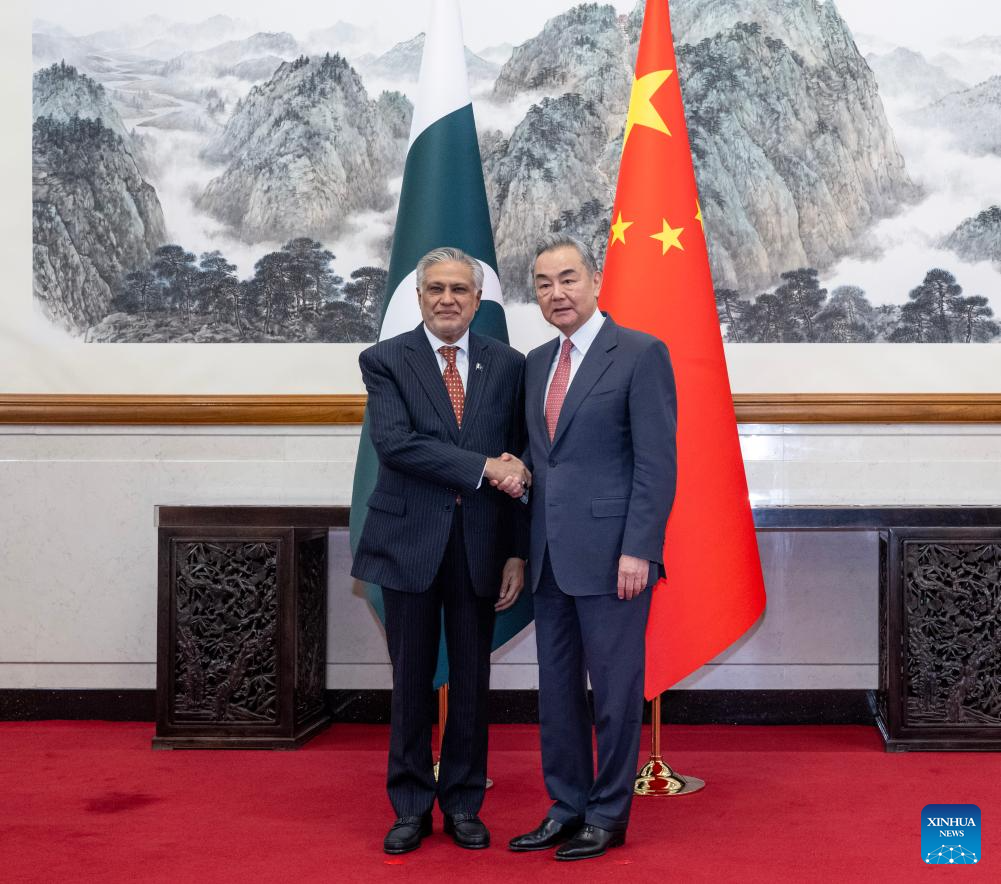Pakistan boosts ties with China after clashes with India; meanwhile, Balochistan burns
The Pakistani Foreign Minister travelled to Beijing to boost the CPEC project, which will also include Afghanistan. While tensions with India have subsided, violence continues in Balochistan where a bomb attack against a school bus kills several children. The missile exchange between India and Pakistan is redefining the geopolitical alliances across Eurasia.
Islamabad (AsiaNews) – After armed clashes with India, Pakistani Foreign Minister Mohammad Ishaq Dar, who also serves as deputy prime minister, went to Beijing for talks with his Chinese counterpart, Wang Li.
According to official statements, Pakistan said it had agreed to boost trade and investments with China, while Beijing, after stressing that it welcomes and supports India and Pakistan in their efforts to properly manage their differences through dialogue, stressed that it will support, as always, the sovereignty and territorial integrity of its ally.
The two countries agreed to increase cooperation not only in trade and investments, but also agriculture, manufacturing, and other sectors, the Pakistani foreign minister said, adding that he and Wang also got together with Taliban Foreign Minister Amir Khan Muttaqi in a separate meeting in Beijing to discuss the extension of the China-Pakistan Economic Corridor (CPEC) to Afghanistan as well. The next meeting of ministers will be held in Kabul.
The CPEC is part of the Belt and Road Initiative's infrastructure projects, but it has long been targeted by Baloch separatists who oppose the exploitation of resources on their territory by China and the Pakistani government.
Civil society groups have also complained for years over the repressive ways in which the Pakistani military has tried to contain local demands for autonomy, such as torture, enforced disappearances, and extrajudicial killings.
During the meetings, Pakistani officials pledged to protect Chinese staff, projects and entities in Pakistan. In fact, while clashes with India seem to have abated for now, the wave of terrorist violence sweeping the country in the past few years continues.
The latest includes a school bus carrying 40 schoolchildren that was hit in a bomb attack this morning in Balochistan; at least five people, mostly children, were killed with scores wounded.
Pakistan's Interior Minister, Mohsin Naqvi, condemned the attack, calling it “sheer barbarism" and spoke of the attackers as "beasts who target children" seeking to destabilise the country.
No group has claimed responsibility for the event, but many have already pointed the finger at the Balochistan Liberation Army (BLA), which took a passenger train hostage in March, showing that it had strengthened its terrorist capabilities.
For its part, the Pakistani military claims that India was behind the attack, along with its allies in Balochistan, a reference most likely to the BLA.
Despite formal statements and the continuous warmongering rhetoric, aimed above all at domestic consumption (Pakistanis have shown renewed interest and support for their military), India and Pakistan have resumed diplomatic contacts.
Maintaining the line drawn by the military, Pakistani Prime Minister Shehbaz Sharif said that, “Talks on all issues including Indus Water Treaty, Terrorism will be held with India. India's terrorism in Pakistan will be talked too”.
India had suspended talks on the Indus Water Treaty immediately after the attack on 22 April in Pahalgam, Kashmir, which set off the escalation of violence.
India’s tough stance towards Pakistan is also probably due to the fact that it has been taken by surprise by the technical progress shown by the Pakistani military.
According to a research group linked to the Indian Ministry of Defence, China provided Pakistan with satellite and air defence support while the clash with India was underway, a sign of greater Chinese involvement than initially assumed, writes Bloomberg.
Ashok Kumar, director general of the Centre for Joint Warfare Studies, notes that China has helped Pakistan reorganise its radar systems more effectively to detect the geolocation of Indian forces and weaponry.
Mao Ning, a spokesman for the Chinese Foreign Ministry, did not directly address the issue in Monday’s weekly press conference. “Both India and Pakistan are China's important neighbours,” he simply said.
Pakistan also enjoys military support from Turkey and Azerbaijan. Precisely in response to these new alliances redefining the Eurasian geopolitical chessboard, India recently decided to suspend travel to these two countries citing security reasons, but also announced the sale of weapons to Armenia.
31/08/2021 11:19







.png)










